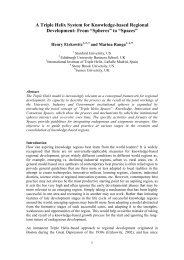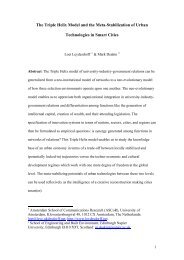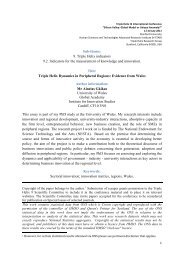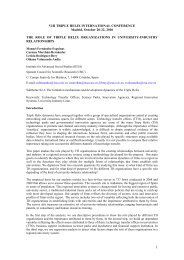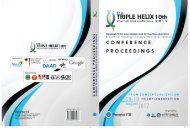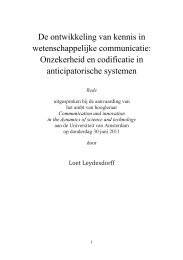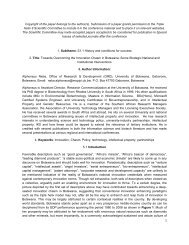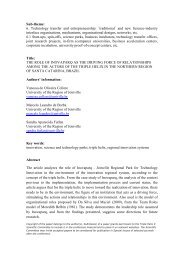TRIPLE HELIX noms.pmd
TRIPLE HELIX noms.pmd
TRIPLE HELIX noms.pmd
You also want an ePaper? Increase the reach of your titles
YUMPU automatically turns print PDFs into web optimized ePapers that Google loves.
O-023Third-Party Logistics Provider Cluster Initiation using iTAP MechanismPhongchai Jittamai, Naphatthamon Phuwasitbenchapa, ITAP-Suranaree University Of Technology, ThailandIntroductionOver the past 19 years, Industrial Technology Assistance Program (iTAP) has proven to be a successful mechanism thatprovides technology support and development to small and medium enterprises (SMEs) in Thailand. It was established in 1991under the name “Industry Consultancy Services” (ICS) and formally changed to iTAP in 2001. Currently, iTAP is a unit under thesupervision of National Science and Technology Development Agency (NSTDA), a national research agency that conductsresearch in various fields and also provides funding to other organizations in Thailand.iTAP has a clear cut vision to enhance technology for Thai SMEs in order to increase competitiveness in world market. In orderto fulfill this obligation, iTAP started building its network to other regions in Thailand, beginning in Chiang Mai in 2001. Right nowthere are iTAP networks located at nine universities nationwide. Suranaree University of Technology has been iTAP networksince 2004. With tremendous help from all networks, iTAP has grown rapidly over the past several years. The number of projectsthat support the private sector has increased exponentially. There are more than 2,000 projects approved from 1991 to 2009.Most projects are product or process related such as product innovation, process innovation, product development and processdevelopment.The introduction of ASEAN Free Trade Area (AFTA), which will be fully operational in six member countries in the beginning of2010, has raised some concern to a lot of SMEs especially those in the service providing industry such as logistics andtransportation provider. The influx of products from member countries and also China will increase market and price competitivenessparticularly in reducing transportation and logistics costs. It is also iTAP’s goal to put service providing industry into perspectiveand supply assistance to meet its needs. So SMEs in this section will be able to enhance their abilities to compete with foreigncompanies. It is an objective of this paper to develop an iTAP network expansion model to initiate third party logistic providercluster under the tripartite cooperation among government agency, university and industry sector. It is also our goal to show thatthe impact of knowledge development and community expansion has been accented under this proposed model.MotivationIn 2001, iTAP Suranaree University of Technology network was approached from one client, which is a leading logistics companyin Thailand, to find an appropriate way to improve its suppliers. This client does not own the transportation fleet but uses thirdpartylogistics providers as tools to fulfill transportation jobs. There are more than 300 suppliers under this client’s network.Most of them have not developed any foundation for quality development. Their daily planning and operation are conductedbased solely on past experience. Fleet maintenance has not been organized and managed properly. These factors contributeto higher operating cost and lower vehicle utilization. Client thought that quality standard system such as ISO 9000 systemcould help suppliers improve their management system. However, it is impractical to implement the system for these suppliersto be fully functional within a one-year time period. As we have known that most Thai SMEs have not had strong foundation andto put the complex system such as ISO 9000 would be way too much for these SMEs to handle and manage. iTAP proposedthe basic quality system called Thai Foundation Quality System (TFQS) as an appropriate tool for these suppliers. The clientdecided to ask iTAP to implement TFQS to its five suppliers as a pilot study for 12-month duration.TFQS-The MethodologyTFQS was developed by NSTDA to be a prototype for quality management in an appropriate level for SMEs who are notnecessary or ready for ISO 9000 system. It has fewer number of auditing criteria than ISO 9000 and is not too difficult toimplement. It can create a strong foundation for SMEs. Moreover, if TFQS has been implemented successfully, it is not difficultfor SMEs to continue improving its process to meet ISO 9000 certification.iTAP uses its support mechanism by using its network to administer the project. This TFQS project for logistics suppliers wasconducted by the cooperation between iTAP central and iTAP Suranaree University of Technology (SUT) network, where thelatter was the leader that managed this project. TFQS expert was provided to implement the basic quality system and iTAPprovided auditor team. Besides, the client had actively involved in mentoring, supporting its suppliers as well as adding competitionambiance among five suppliers throughout the implement process. This factor is crucial to the success of the project.ResultsTFQS has been implemented successfully in these five suppliers within 13 months. These companies were audited and alsopassed the minimum requirements. The outputs of this project that can be measured are as the following: better work flow;improved communication within organization; more client-focus; reduced number of traffic accident; cost reduction; improvedvehicle utilization; better check and balance system within company.Madrid, October 20, 21 & 22 - 2010168



